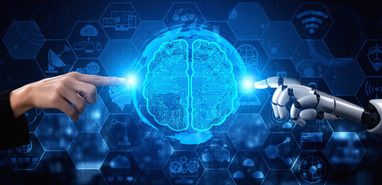
Explore the potential and advancements of generative AI, focusing on its technological and societal impact.
Generative AI, a branch of Artificial Intelligence dedicated to generating new content, is currently revolutionizing various sectors. From creating realistic images to composing music and writing stories, this technology offers immense potential. Looking ahead, key trends and emerging forms will shape the future evolution of generative AI.
Technological Advancements
The core technology behind generative AI is continually improving. Methods such as Generative Adversarial Networks (GANs) and Variational Autoencoders (VAEs) are evolving to produce higher-quality and more diverse outputs. Future models are expected to become more efficient, requiring fewer computational resources, thereby becoming accessible to a broader audience.
One of the most notable improvements in technology is the efficiency of these models. As these models become more advanced, they are likely to require fewer computational resources, making them accessible to a broader range of users, from large corporations to individual hobbyists. The increased efficiency will not only democratize the use of generative AI but also lead to more sustainable and environmentally friendly AI practices.
Additionally, the integration of advanced machine learning algorithms is expected to enhance the capabilities of generative AI. These algorithms will improve the accuracy and quality of AI-generated content, making it nearly indistinguishable from human-created content. This progress will open new avenues for creative and commercial applications, further embedding AI into our daily lives.
Ethical and Legal Considerations
As generative AI becomes more widespread, ethical and legal issues arise. Discussions surrounding ownership, copyright, and the use of AI in creating ‘fake news’ are critical. The industry must develop strategies to address these concerns to ensure responsible use of generative AI.
The ethical considerations extend to the accountability of AI-generated content. For instance, who should be held responsible if an AI-generated piece of content infringes on someone else’s intellectual property rights? Similarly, the creation of ‘deepfakes’—realistic but fake videos and images generated by AI—poses significant ethical and legal challenges. As the technology becomes more sophisticated, the potential for misuse increases, necessitating robust legal frameworks and ethical guidelines.
Moreover, the transparency of AI systems is another crucial ethical issue. Users and creators of generative AI must understand how these systems work and the potential biases they may introduce. This transparency is essential for building trust and ensuring that AI systems are used responsibly and ethically.
Personalization and Customization
The advancement of generative AI will enhance personalization in content creation, aligning with consumer preferences. This could transform marketing, entertainment, and education by tailoring content to individual tastes and how users perceive information.
In marketing, generative AI can create personalized advertisements tailored to individual preferences, increasing engagement and conversion rates. For example, AI can analyze user data to generate targeted marketing messages that resonate with specific audiences. This level of personalization is expected to revolutionize digital marketing, making it more effective and user-centric.
In the entertainment industry, generative AI can create personalized content experiences. For instance, AI can generate customized storylines in video games based on player preferences and actions. This capability will enhance user engagement and create more immersive and interactive entertainment experiences.
In education, generative AI can create personalized learning experiences for students. By analyzing individual learning styles and preferences, AI can generate customized educational content that enhances learning outcomes. This personalized approach can help address the diverse needs of learners and improve educational equity.
Interaction Between AI and Humans
The future will likely see increased collaboration between AI and human creators. Generative AI can enhance creativity by suggesting ideas and variations not previously considered. This synergy could lead to entirely new forms of art and narrative that leverage the strengths of both.
For example, in the field of art, AI can assist artists by generating novel ideas and concepts, which the artists can then refine and develop further. This collaboration can lead to the creation of unique and innovative artworks that blend human creativity with AI’s computational power.
In literature, generative AI can help writers by providing plot suggestions, character development ideas, and even generating entire paragraphs of text. Writers can use these AI-generated ideas as inspiration or as a starting point for their own creative process. This collaboration can lead to the creation of rich and diverse literary works.
In music, AI can assist composers by generating musical compositions based on specific styles and genres. Composers can then modify and build upon these AI-generated compositions to create original pieces of music. This collaboration can lead to the creation of innovative and diverse musical works that push the boundaries of traditional music.
Expansion into New Domains
While generative AI has already made significant inroads into the arts, including painting, music, and writing, it is poised to venture into other fields. Potential applications include creating dynamic environments and stories in gaming and aiding in the development of innovative product designs.
In gaming, generative AI can create dynamic and immersive game environments that respond to player actions and choices. This capability can lead to more engaging and interactive gaming experiences, where players feel a greater sense of agency and immersion. Additionally, AI can generate unique storylines and quests, providing players with a diverse range of experiences and replayability.
In product design, generative AI can assist designers by generating innovative design concepts and solutions. For example, AI can analyze user preferences and market trends to generate product designs that are both aesthetically pleasing and functional. This capability can lead to the creation of products that better meet consumer needs and preferences.
In healthcare, generative AI can assist in drug discovery and development by generating potential drug compounds and predicting their effectiveness. This capability can accelerate the drug discovery process and lead to the development of new treatments and therapies. Additionally, AI can assist in medical imaging and diagnosis by generating detailed and accurate images of medical conditions, aiding in early detection and treatment.
Improving Accessibility
Generative AI will become less technical and more user-friendly, allowing individuals without advanced technological backgrounds to utilize it. This democratization of technology will enable more people and businesses to engage with AI in creative ways.
For example, AI-powered tools and platforms can provide user-friendly interfaces that allow individuals to create AI-generated content without needing advanced technical skills. These tools can include drag-and-drop interfaces, pre-built templates, and intuitive controls that make it easy for users to interact with AI systems.
In addition to making AI more accessible, efforts to provide education and training on AI will be crucial. By offering courses and resources on AI concepts and applications, individuals and businesses can develop the skills and knowledge needed to leverage AI effectively. This education and training can help bridge the gap between technical experts and non-experts, fostering a more inclusive AI ecosystem.
Enhanced Realism
The realism of AI-generated content will continue to improve. Although this raises concerns in the context of deepfakes, it also offers opportunities for developing educational scenarios, historical visualizations, and more. The challenge lies in amplifying the positive applications while minimizing misuse.
For example, in education, AI-generated realistic simulations and visualizations can provide immersive and interactive learning experiences. Students can explore historical events, scientific phenomena, and complex concepts in a highly engaging and interactive manner. These realistic simulations can enhance understanding and retention, making learning more effective and enjoyable.
In the field of entertainment, AI-generated realistic content can create immersive and engaging experiences for audiences. For example, AI can generate realistic virtual environments and characters for movies, video games, and virtual reality experiences. These realistic elements can enhance the storytelling and create more captivating and memorable experiences for audiences.
Integration with Other Technologies
AI will gradually merge with technologies like Virtual Reality (VR) and Augmented Reality (AR) to enhance user experiences. This integration could revolutionize the entertainment industry by providing immersive and interactive experiences that blur the line between reality and fiction.
For example, AI-powered VR and AR experiences can create highly realistic and interactive virtual environments that respond to user actions and preferences. These experiences can provide users with a sense of presence and immersion, making them feel like they are part of the virtual world. This capability can be used in various applications, including gaming, education, training, and therapy.
Additionally, the integration of AI with the Internet of Things (IoT) can create smart and connected environments that enhance user experiences. For example, AI-powered smart home systems can analyze user behavior and preferences to create personalized and automated home environments. These systems can control lighting, temperature, entertainment, and security, providing users with a seamless and convenient living experience.
Addressing Bias
Generative AI models often inherit biases from their training data. Future advancements will focus on promoting fairer distribution and reducing biases in AI development, ensuring more equitable outcomes.
Efforts to address bias in AI include developing more diverse and representative training datasets, implementing bias detection and mitigation techniques, and promoting transparency and accountability in AI development. By addressing these biases, AI systems can produce fairer and more accurate outcomes, reducing the risk of perpetuating harmful stereotypes and discrimination.
Additionally, collaboration between AI developers, policymakers, and stakeholders will be crucial in addressing bias and promoting fairness in AI. By working together, these groups can develop guidelines, standards, and regulations that ensure AI systems are developed and used responsibly and ethically.
Economic Impact
Generative AI will have significant economic implications, potentially disrupting job markets as AI can perform specific tasks. However, it will also create new career opportunities in AI supervision, ethics, and related fields. The challenge will be to balance these shifts to facilitate a smooth transition for the workforce.
As AI systems automate routine and repetitive tasks, some jobs may become obsolete. However, AI will also create new jobs and career opportunities in areas such as AI development, implementation, maintenance, and ethics. These new roles will require a different set of skills and expertise, necessitating investment in education and training programs to prepare the workforce for these changes.
Furthermore, the economic impact of AI will extend to various industries, including manufacturing, healthcare, finance, and entertainment. AI-powered automation and optimization can increase efficiency, productivity, and innovation, driving economic growth and competitiveness. However, it will be essential to ensure that the benefits of AI are distributed equitably, and that workers and communities are supported during the transition.
Conclusion
Generative AI is an exciting and promising concept with immense potential and inherent risks. As we navigate this emerging field, it is crucial to cultivate an entrepreneurial mindset that integrates ethical considerations. The future of generative AI is not just about new inventions but creating a future where AI benefits humanity and contributes to a better world.
By focusing on technological advancements, ethical and legal considerations, personalization and customization, human-AI interaction, expansion into new domains, improving accessibility, enhanced realism, integration with other technologies, addressing bias, and economic impact, we can harness the power of generative AI to create positive and transformative change. As we move forward, it is essential to prioritize responsible and ethical AI development to ensure that generative AI fulfills its potential to enhance our lives and society.








By Andrej Kovacevic
Updated on 14th July 2024